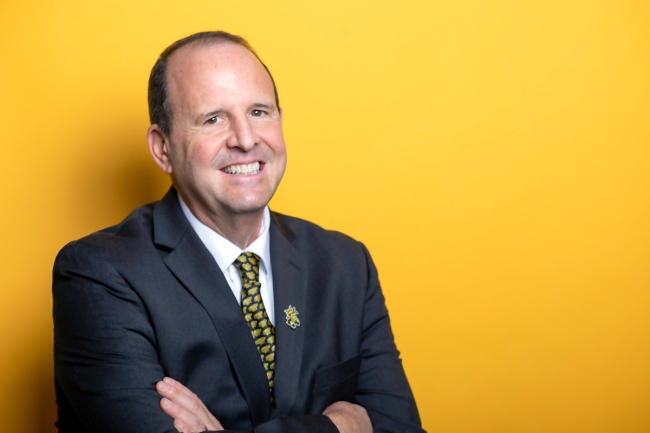You have /5 articles left.
Sign up for a free account or log in.

Wichita State University president Jay Golden
Wichita State University
A whirlwind day of speculation over the fate of Wichita State University's president ended with a vague and noncommittal statement from the Kansas Board of Regents.
"The Kansas Board of Regents is committed to working with all our universities and colleges to support and promote freedom of speech and diversity and inclusion. During these unprecedented times, our universities have been forced to make quick decisions and act swiftly without the normal process of including all our stakeholders in decision making," the statement read. "We appreciate your patience and understanding as we work to improve communications during times of crisis. We look forward to strengthening relationships with students, alumni and friends. It is vital that all stakeholders join us in this effort."
The board met for four hours Wednesday afternoon in a closed executive session after donors to Wichita State University reportedly threatened to pull their support for the university unless the board dismissed President Jay Golden.
In the days leading up to the Wednesday meeting, a debate raged at Wichita State over donor influence in university and governance decisions and the responsibility of a university president to serve students and protect free speech on campus.
A week earlier, Wichita State University Tech announced and quickly canceled a planned commencement address by Ivanka Trump. Trump, who is President Donald Trump's daughter and senior adviser, was slated to give a virtual address during WSU Tech’s June 6 virtual commencement. WSU Tech, formerly known as Wichita Area Technical College, is public community college and affiliate of WSU.
The decision to invite Trump was met with immediate faculty and student backlash. The majority of faculty supported the decision to cancel Trump’s speech, said Aleks Sternfeld-Dunn, director of Wichita State's School of Music and president of its Faculty Senate.
“I don’t think the anger or the frustration was about having a political person on our campus to speak about a political topic, because she’s been on our campus before,” Sternfeld-Dunn said. “She, to many, represents a viewpoint that is antithetical to what is happening in a national dialogue, so it became a distraction.”
Golden and Sheree Utash, president of WSU Tech, released a statement on June 4 that commencement plans had “been refocused more centrally on students -- student voices in particular.” Rebecca Zinabu, a WSU Tech practical nursing graduate, was the only speaker during the commencement ceremony, which took place last Saturday.
Golden and WSU spokespeople did not respond to requests for comment Wednesday.
The day before commencement, Trump shared her pre-recorded speech on Twitter alongside comments about cancel culture.
“Our nation’s campuses should be bastions of free speech. Cancel culture and viewpoint discrimination are antithetical to academia,” she wrote. “Listening to one another is important now more than ever!”
Several donors to the university were upset by the decision to cancel Trump’s speech, The Wichita Eagle reported. Among them was Koch Industries, a multinational corporation based in Wichita, Kans., and owned by Charles Koch, an influential player in conservative politics. Koch Industries released a statement Wednesday saying it will not pull its support but that it objects to disinviting speakers, the Wichita Business Journal reported.
The Wichita State University Student Government Association released a statement in support of the president Wednesday. The association had met with Golden after Trump’s planned commencement speech was announced, arguing that bringing her to campus would “only divide our campus, our students and our city.” The Wichita State College Republicans also put out a statement in support of Golden.
In addition, a petition is circulating on behalf of students in support of Golden, titled “WSU wants Dr. Golden to remain our President!” As of Wednesday evening, the petition had more than 7,000 signatures.
Sternfeld-Dunn worried that a decision by the board to remove the president over the commencement speech controversy would set a poor example for future presidents.
“If the president is removed for making a controversial decision, then how does the next person come in and not walk on eggshells with every decision, worried about what their fate might be?” he asked.




